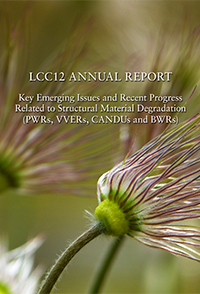
Key Emerging Issues and Recent Progress Related to Structural Material Degradation (PWRs, VVERs, CANDUs, and BWRs)
(LCC12)
During operation, the materials used for the construction of components react with light water reactor environment and cause component degradation, including cracking at welds and piping. Such degradation is due to irradiation, corrosion, fatigue, and other damage mechanisms, and has remained a severe operational challenge for utilities. Details on such degradation are regularly reported and published in scientific journals and at utility workshops and conferences. Foremost in the latter category are those organized since 1983 by NACE, TMS, ANS and CNS in the Environmental Degradation of Water Reactor Materials.
This Report contain highlights from the 17th International Conference on Environmental Degradation of Materials in Nuclear Power Systems-Water Reactors, which was held in Ottawa, Canada in August 2015. It covers PWRs, VVERs, CANDUs and BWRs. Over 150 papers were published at this conference and this Report cover diverse topics touching on specific degradation modes in various alloys, such as:
- PWSCC of cold worked Alloy 690 and its weld metals
- Corrosion fatigue of stainless steels in PWRs and BWRs
- Fuel cladding materials
- Cracking of Alloy 718 and X750
- Flow assisted corrosion
- Oxide films and characterisation in PWR Secondary systems
- SCC of Alloy 82 and 182 welds
- IASCC of stainless steels
- Irradiation studies involving ion and neutron irradiation
- Synergistic effects of thermal ageing and neutron embrittlement
- Alloy 600 oxidation and mechanisms in PWRs
- PWR Field experience
- Advances in in-situ monitoring and ex-plant and mockup component evaluation
- Generation IV materials research
- Fundamental studies involving new state-of-the-art microscopy and other techniques
- Fukushima accident related research on SS corrosion in sea water
- Dry Cask Storage System and Waste Container Corrosion




